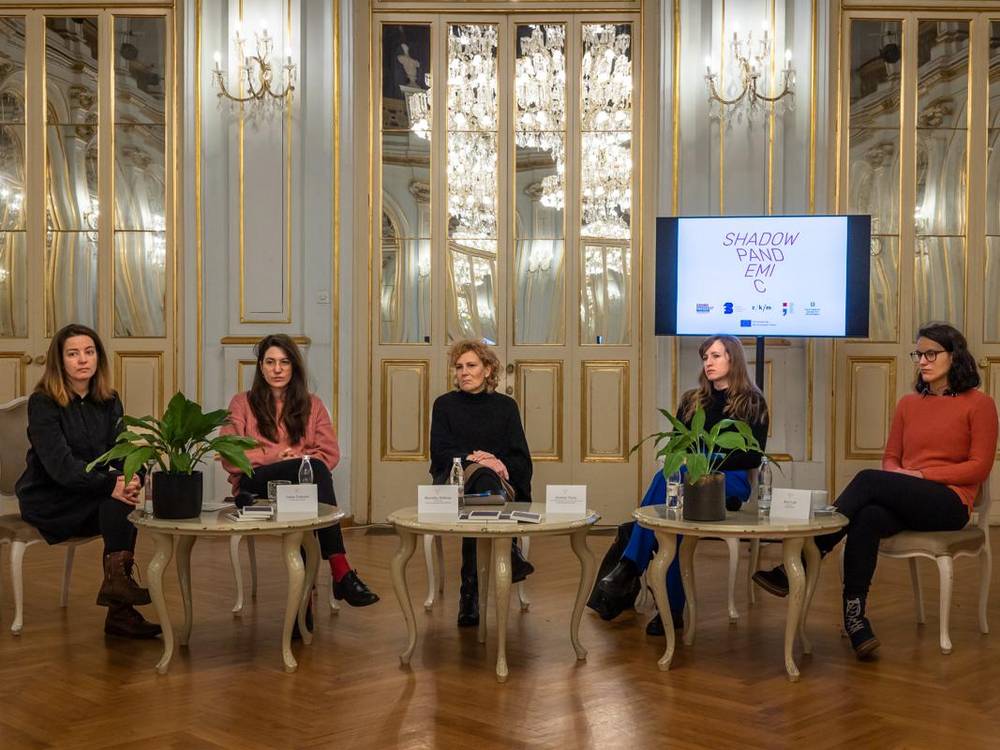On 14 December 2022, consultant-analyst at the Centre for Human Rights Jerneja Turin participated at the dramaturgical board discussing the topic of increased violence against women during the pandemic, which was carried out within the Borštnikovo srečanje Festival at the Slovenian National Theatre Maribor. At the board meeting, which was organised as a round table, the Human Rights Ombudsman representative was joined by the representative of the Maribor Centre for Social Work Marinka Dobrajc and a journalist from Večer, Ana Lah.
The event, hosted by dramaturge Ivana Vuković, is part of the Sence pandemije: skriti glasovi (Shadow Pandemic: Hidden voices) international project, within the framework of which a public competition was published for the selection of three new drama texts addressing the problem of the (increased) violence against women during the time of the lockdown of public life due to the coronavirus pandemic.
In the debate about the rise in the violence against women during the time of the lockdown due to the pandemic, the participants particularly touched upon the media reports about violence against women. In addition to some very good journalistic practices (including e.g. numerous radio shows on Radio Prvi, which dive deep into this issue) Jerneja Turin brought attention to the fact that femicides are often reported about in a manner that seeks reasons why it occurred, which indirectly sends a message that the victim herself somehow contributed to it. It is important to emphasise that the guilt for violence belongs solely to the perpetrator. Turin warned about the necessary responsibility in reporting and making sure that it does not lead to secondary victimisation.
Turin also stresses the lack of research about the presence of violence that would reveal the true scope and emphasises that the great majority of violence remains non-reported. She also pointed out that victims of violence had a hard time finding help during the lockdown since they spent more time at home together with the person causing the violence.
The Human Rights Ombudsman’s representative also touched upon the need to raise awareness about the importance of the fact that those who are witnesses to violence must report it and thus help the victim. Unfortunately, in our society violence is still normalised and many perceive it as a private matter. The debate then continued about the state of (in)equality between the sexes and how that intensified during the pandemic. Namely, women were the ones who carried the bigger share of the burden of caring for the household, children, and their home schooling.
The closing questions of the round table dealt primarily with the topic from the artistic perspective. Does dealing with this subject require personal experience, where is the line between social and personal, whether we are to address only the more extreme forms of violence or others, too, what is the responsibility of female authors, etc.

![[Translate to English:] Ženske sedijo na prizorišču dramaturškega kolegija v SNG Maribor in govorijo o nasilju nad ženskami med pandemijo [Translate to English:] Ženske sedijo na prizorišču dramaturškega kolegija v SNG Maribor in govorijo o nasilju nad ženskami med pandemijo](/fileadmin/_processed_/d/7/csm_Nasilje_nad_zenskami_Turin_MB_avtor_Bostjan_Lah_FBS_bf6a231cfb.jpg)